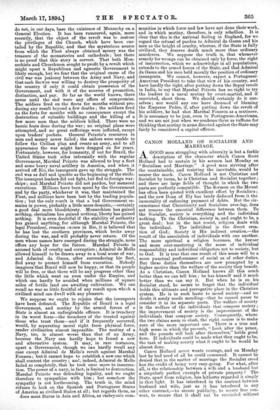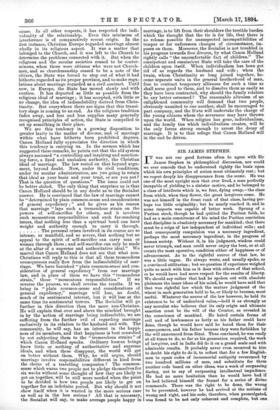CANON HOLLAND ON SOCIALISM AND MARRIAGE.
AGOOD man struggling with adversity is but a feeble description of the character which Canon Scott Holland had to sustain in his sermon last Monday on " Socialism and Marriage." A good man striving after the unattainable, and resisting the inevitable, would be nearer the mark. Canon Holland is not Christian and Socialist by turns, he is Christian and Socialist together ; and there are large fields of thought in which the two parts are perfectly compatible. The Sermon on the Mount has often been quoted with excellent effect by Socialists ; and the new Dean of Ely has lately deduced from it the immorality of enforcing payment of debts. But the cir- cumstance that Christianity and Socialism over-lap, does not remove the essential difference between them. To the Socialist, society is everything and the individual nothing. To the Christian, society is, and ought to be, a great deal ; but in the last resort, religion deals with the individual. The individual is the direct crea- tion of God ; Society is His indirect creation,—the result of the association of individuals with one another. The more spiritual a religion becomes, the keener and more over-mastering is the sense of individual responsibility and individual obligation not to society, but to God. It is true that one result of this sense will be a more punctual performance of social as of other duties. But these duties themselves are now prompted by a higher motive than the welfare of the society they benefit. As a Christian, Canon Holland knows all this much better than we can tell him ; he has himself said it much better than we can say it. But when he is on his Socialist steed, he seems to forget that the individual holds this ultimate and prerogative place in the Christian system. He is in such haste to mend society—and no doubt it sorely needs mending—that he cannot pause to consider it in its separate parts. The welfare of society is the welfare of the individuals that compose society ; the improvement of society is the improvement of the individuals that compose society. Consequently, where the two claims seem to clash, the right course is to make sure of the more important one. There is a true and high sense in which the proverb, " Look after the pence, and the pounds will look after themselves," holds good here. If individuals could be made what they ought to be, the task of making society what it ought to be would be almost done.
Canon Holland never wants courage, and on Monday last he had need of all he could command. It cannot be denied that in the matter of marriage the Socialist creed has the credit of being very easy-going. For what, after all, is the relationship between a wife and a husband but a singularly perfect example of private property ? The State, apart from religion, has hitherto regarded it simply in that light. It has interfered in the contract between husband and wife, just as it has interfered in any other contract,—to secure publicity, to secure free con- sent, to secure that it shall not be rescinded without cause. In all other respects, it has respected the indi- viduality of the relationship. Even this minimum of interference is of comparatively recent origin. In the first instance, Christian Europe regarded marriage almost wholly in its religious aspect. It was a matter that belonged to the Church, and it was left to the Church to determine the problems connected with it. But when the religious and the secular societies ceased to be conter- minous, when there were citizens who were not Church- men, and so churchmanship ceased to be a note of the citizen, the State was forced to step out of what it had hitherto regarded as its proper province, and to make regu- lations about marriage regarded as a civil contract. Until now, in Europe, the State has moved slowly and with caution. It has departed as little as possible from the religious ideal of marriage ; it has accepted, with little or no change, the idea of indissolubility derived from Chris- tianity. But everywhere there are signs that this transi- tory stage is coming to an end. As the religious tradition fades away, and less and less supplies many generally recognised principles of action, the State is compelled to set up something in their place.
We see this tendency in a growing disposition to greater laxity in the matter of divorce, and of marriage within what have hitherto been prohibited degrees. Canon Holland fully appreciates the direction in which this tendency is carrying us. In the sermon which has suggested these remarks, he points out that the old system always assumed "a controlling and inspiring and sanction- ing force, a fixed and unshaken authority, the Christian ideal of marriage. The law rested on that beyond argu- ment, beyond doubt. Now, under its civil conditions, under its secular administration, are you going to retain that ideal as your basis and your trust, or are you not? That is the question of questions." The issue could not be better stated. The only thing that surprises us is that Canon Holland should be in any doubt as to the Socialist answer. He is convinced that the law of marriage cannot be " determined by plain common-sense and considerations of general expediency ; " and he gives as his reason that marriage " lays such a tremendous strain on the powers of sell-sacrifice for others, and it involves such momentous responsibilities and such far-reaching issues, that nothing less than a spiritual bond can have weight and authority enough to carry it through.
The personal crises involved in its course are so intense, so manifold, and so severe, that nothing but an appeal to the spirit of self-sacrifice can carry man or woman through them ; and self-sacrifice can only be made at the altar of a supreme and authoritative ideal." We marvel that Canon Holland does not see that what non- Christians will reply to this is that all these tremendous consequences really flow from the indissolubility of mar- riage. We have banished " plain common-sense and con- sideration of general expediency " from our marriage law, and in place of them we have this "tremendous strain," these "momentous responsibilities." If we reverse the process, we shall reverse the results. If we bring in " plain common-sense and considerations of general expediency," marriage will lose, no doubt, much of its sentimental interest, but it will lose at the same time its sentimental terrors. The Socialist will go further in this direction than the mere non-Christian. He will explain that over and above the mischief brought in by the notion of marriage being indissoluble, we are suffering from the further evil of regarding marriage exclusively in its relation to the husband and wife. The community, he will say, has an interest in the happi- ness of its members, and that happiness is best consulted by not subjecting them to the "tremendous strains" of which Canon Holland speaks. Ordinary human beings know little or nothing of authoritative and supreme ideals, and when these disappear, the world will get on better without them. Why, he will argue, should marriage involve responsibilities different in kind from the choice of a travelling companion ? The common- sense which warns two people not to pledge themselves for six weeks without some thought of how they are likely to get on together, will be still more needed when the point to be decided is how two people are likely to get on together for an indefinite period. But why should it not show itself when it is wanted in the more serious case as well as in, the less serious ? All that is necessary, the Socialist will say, to make average people happy in marriage, is to lift from their shoulders the terrible burden which the thought that the tie is for life, that there is no release possible for unsuspected incompatibilities of temper or for unforeseen changes of circumstance, im- poses on them. Moreover, the Socialist is not troubled in his progress towards free divorce, by what Canon Holland rightly calls " the uncomfortable fact of children." The omnipotent and omniscient State will take the care of the children upon itself. When individualism has been got rid of as regards the husband and wife ; when the twain, whom Christianity so long joined together, be- come separate units in the general brotherhood of man, free to contract temporary alliances for such a time as shall seem good to them, and to dissolve them as easily as they have been contracted, why should the family relation be any better esteemed ? The reasonable altruism of an enlightened community will demand that two people, obviously unsuited to one another, shall be encouraged to part company, and the State will undertake the charge of the young citizens whom the severance may have thrown upon the world. When religion has gone, individualism, and the family ties which individualism creates, will be the only forces strong enough to arrest the decay of marriage. It is to that refuge that Canon Holland will in the end be driven.



































 Previous page
Previous page